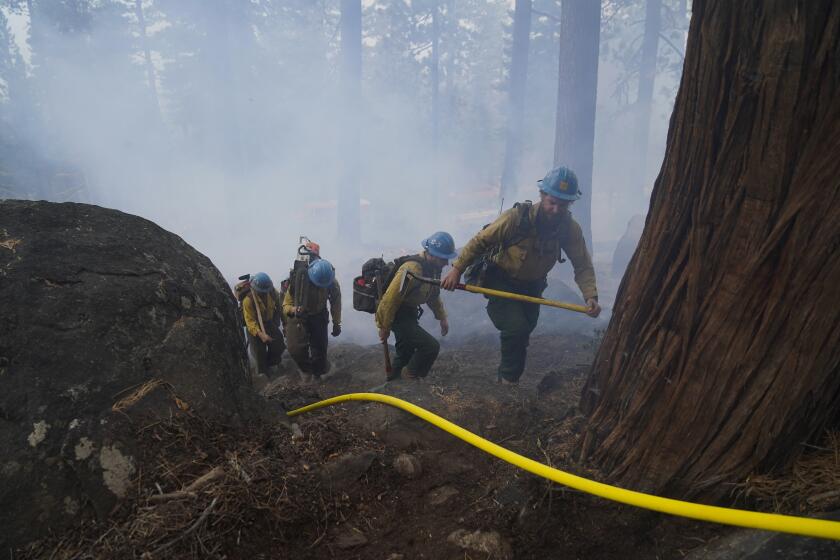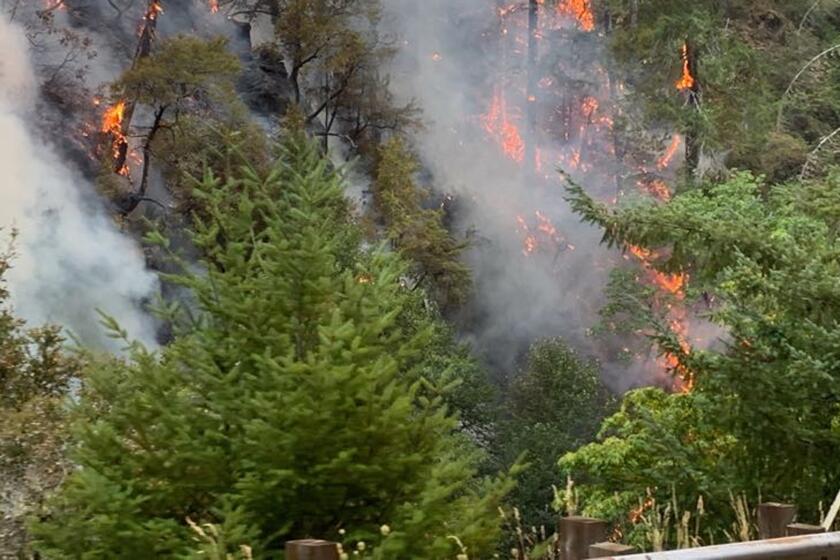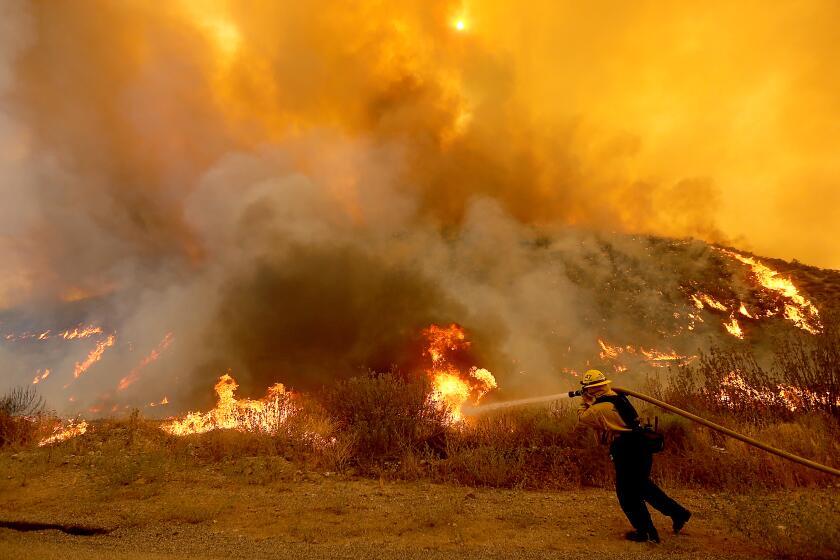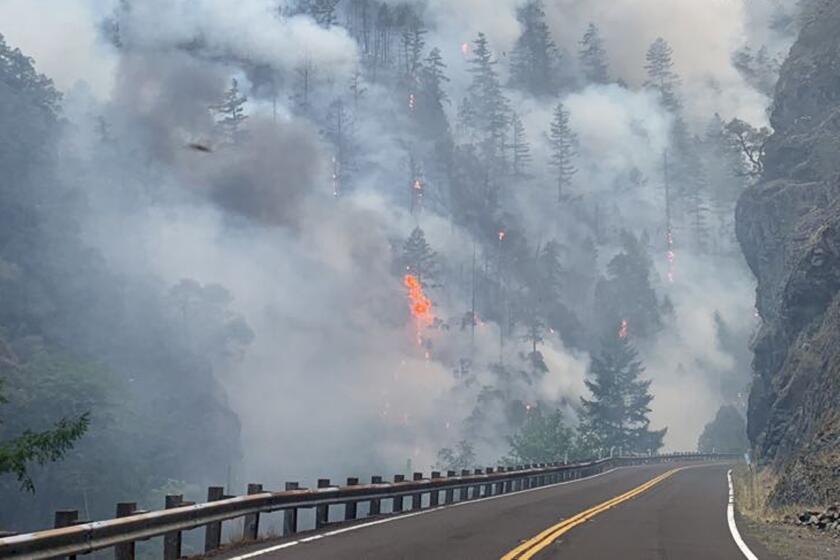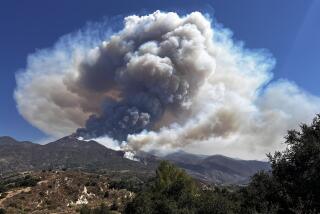Federal firefighters will quit in droves if Congress doesnât take action, union warns
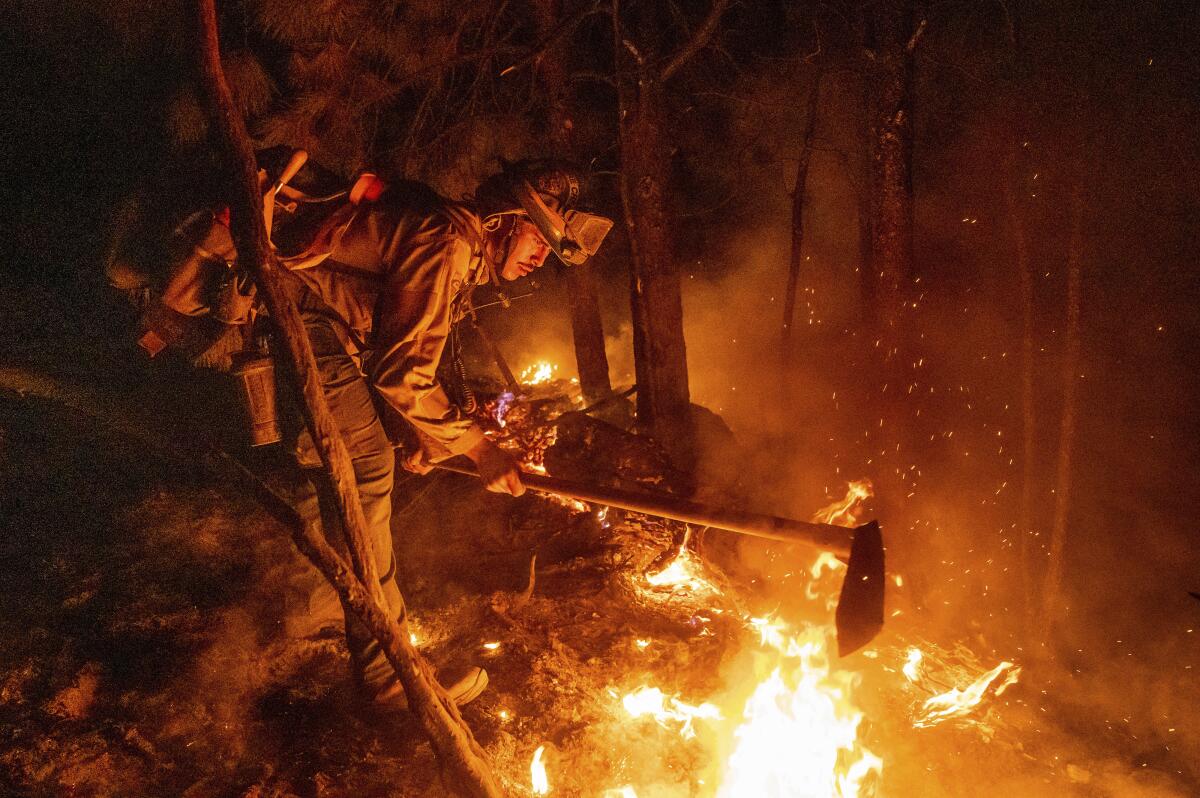
With temporary pay hikes for federal wildland firefighters set to expire in the coming weeks, union officials are warning that the 15,000-member workforce could face a mass exodus if Congress fails to make the increases permanent.
Max Alonzo, national business representative for the National Federation of Federal Employees, said recently that many firefighters were likely to depart for higher paying jobs at state and municipal agencies, or power companies, once they reached the âpay cliffâ â the point at which temporary raises end.
If that were to happen, the consequences would be dire, he said.
âIf we lose our wildland firefighters, weâre going to lose our natural resources, weâre going to lose cities and towns and weâre going to lose lives,â Alonzo said. âThis is not just about wildland firefighters â this is about the safety of our country.â
A federal firefighterâs viral resignation letter is highlighting the jobâs low pay and harsh working conditions in the age of climate change.
The warning comes at a time when worsening wildfires have added to the mental and physical strains of a demanding job, while low wages and lackluster benefits have made it increasingly difficult for the federal government to recruit new firefighters, and retain those with valuable experience.
A bipartisan infrastructure package passed in 2021 sought to address the pay issue by setting aside $600 million to temporarily increase salaries by $20,000 or 50% â whichever was less. But that money is set to run out Sept. 30 for firefighters employed by the Department of the Interior, and Nov. 4 for firefighters employed by the Forest Service, said Riva Duncan, former wildland firefighter and vice president of Grassroots Wildland Firefighters, an advocacy group made up of retired and current federal firefighters.
The legislation Congress is now weighing would permanently increase federal firefightersâ base pay, which can start at as little as $15 an hour. Although some firefighters would still make less than they did with the temporary bonus, the raises would count toward calculating overtime, hazard pay and other benefits.
âItâs a little bit of a trade-off,â Duncan said. âWeâre not super happy about it and wish it was more, but itâs a good first step.â
The bill, however, has become hung up in the House, where itâs been referred to multiple committees, including the House Committee on Oversight and Reform. The committee chair, Rep. James Comer (R-Ky.), did not respond to a message seeking comment.
âI would think this should be the top priority the committee should be pursuing,â said Rep. Joe Neguse (D-Colo.), who introduced the bill in the House last month with bipartisan support. âItâs a crisis we need to address and warrants immediate action by the Congress.â
âWhile I donât want to comment directly to the legislation or speculate as to what the holdup is â we know avoiding this pay cliff is imperative for retaining and recruiting the federal wildland firefighting workforce,â Shayne L. Martin, assistant director of media relations for the Forest Service, said in a statement.
As global warming and a legacy of past land management decisions fuel more explosive and destructive wildfires, federal crews are suffering increased rates of suicide, burnout and certain cancers. Larger fires are also adding to the jobâs traditional dangers and difficulties, such as exposure to smoke and other toxins, long stretches away from home and physical privation.
âLiving out of your truck on government compounds while youâre fighting fire is not an uncommon thing,â said Ben Strahan, superintendent of the El Dorado Hotshots, an elite team of highly trained Forest Service firefighters based in Northern California.
Dozens of vehicles on the Smith River Complex fire were found to have been fueled up with gasoline instead of diesel, or vice versa, forcing a tactical pause.
Alonzo said he had been told that the chair of the House Committee on Natural Resources, Rep. Bruce Westerman (R-Ark.), is unwilling to push the legislation forward, citing a rule adopted by House Republicans that prohibits consideration of measures that would result in a spending increase without identifying ways to offset the increase. Representatives for Westerman declined to comment.
âI keep telling them we donât call you and ask you where to put fires out,â Alonzo said. âDonât ask us where to find money in Congress. We need these representatives to do their jobs. Theyâre not doing their jobs at this point.â
Janelle Valentine, 29, whose husband is a fuels technician on the Gila National Forest in New Mexico, traveled to Washington last week to lobby for the legislation. When she got the call requesting her presence, she was waiting in line at a food bank.
Absent intervention, Valentineâs husband will take a pay cut of $1,504 per month â essentially their entire mortgage. The couple share two children, ages 1 and 3. They live paycheck to paycheck, surviving on credit cards in the offseason. The raise from the infrastructure package enabled them to start paying down some of that debt, Valentine said.
âIf this goes away, we will have no option but to seek employment elsewhere,â she said. âWe literally will not be able to afford to survive at all.â
The legislation falls short of the comprehensive reforms firefighters and advocates have long been pushing for, including housing stipends, expanded mental health programs and a national registry to track chronic diseases caused by on-the-job exposure to environmental hazards. A bill that would accomplish these measures, named for the late Forest Service smokejumper Tim Hart, appears unlikely to pass this legislative session.
Scientist Patrick T. Brown said he withheld the full truth to get his California wildfire research published in Nature. A firestorm followed.
Strahan, the hotshot superintendent, worries that a mass exodus would reduce the institutional knowledge needed to fight increasingly complex fires.
âYouâre asking people with a lot less experience, a lot less perspective, a lot less education and knowledge to pick up the torch and try and achieve the same things weâre doing right now,â Strahan said.
Heâs tried to remain optimistic, but at the same time, the cost of gas, utilities, health insurance and medications for his daughter, who has cystic fibrosis, has risen precipitously, he said. The fire insurance on his home has quadrupled.
âMy entire livelihood is reliant on overtime and hazard pay,â he said. âIf I donât make 1,000 hours, I make peanuts.â
Strahan reached a low point three years ago and thought about killing himself. He credits his recovery to therapy, which he paid for out of his own pocket, and he tries to impart lessons he learned to others.
Firefighters have been asking for better pay and benefits for Strahanâs entire career and have been repeatedly told that reforms take time, he said. But heâs no longer confident that the change will be sufficient, or that it will happen quickly enough. Heâs looking for another job.
âThe trust is being fractured at every level,â he said. âThe work environment is becoming more difficult. I canât lie to my folks that work under me anymore and tell them things are going to get better because I donât know if thatâs true or not.â
Wildfires knocked out power to an entire California county. The unprecedented fight to bring it back
With power lines threatened for weeks by fires on the North Coast, officials formed what appears to be Californiaâs largest and longest-running microgrid powered by generators.
The departure of federal firefighters would also compromise the governmentâs ability to implement sorely needed fuels treatments, such as forest thinning and prescribed burning projects.
A recent report by the Stanford Woods Institute for the Environment found that lack of personnel was a barrier to doing more of this work.
An estimated 20% of Forest Service permanent firefighter positions are vacant, and data suggest that even if all the positions were filled, there still would not be enough firefighters available to meet the demands posed by longer, busier and more severe fire seasons â let alone to do the needed fuels treatments, the report found.
âWe donât have the personnel or the support like we used to have,â said a Forest Service assistant fire engine operator based in California, who asked that his name be withheld out of fear of retaliation. âI know that on my forest alone, there were three engines shut down for lack of staffing, and captains were taking jobs in the middle of the fire season to go to structure [firefighting] or PG&E or any company that will hire them.â
If the temporary raises expire, the firefighter expects heâll be evicted. Already, he lives out of state, where rent is cheaper, and drives his momâs truck because he canât afford his own vehicle. Heâs taken to bedding down in a sleeping bag on top of a cot at his station several nights a week to save on gas. He was recently injured on a fire, but chose to continue working because he didnât feel comfortable being pulled off the line because of staffing shortages, and because being put on light duty would prevent him from earning overtime.
âThe fact that Iâm 36 going on 37, in a career fire job and I have to borrow a truck from my mom â it kills me because I feel like I should be self-sufficient,â he said.
More to Read
Sign up for Essential California
The most important California stories and recommendations in your inbox every morning.
You may occasionally receive promotional content from the Los Angeles Times.
